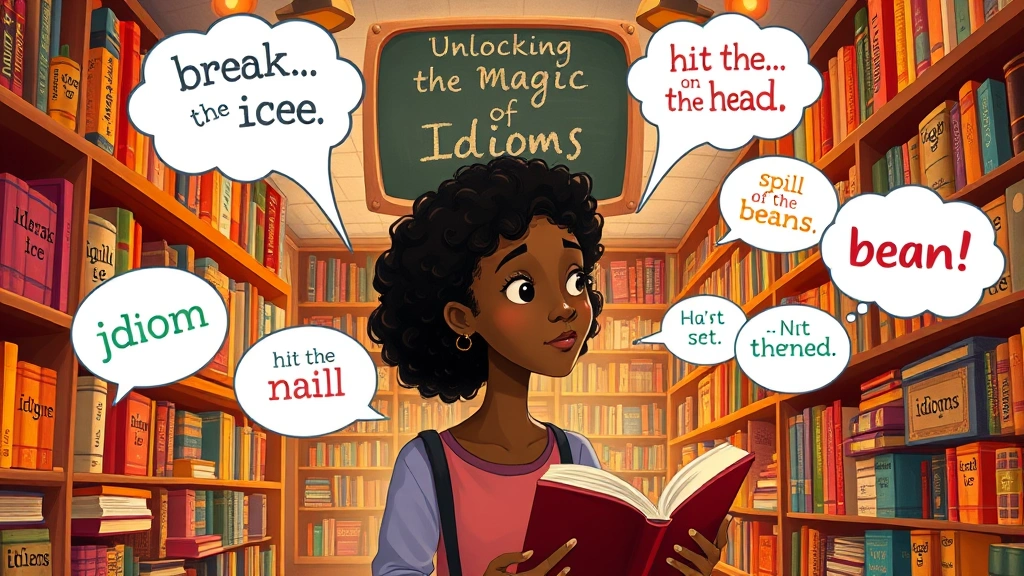Have you ever found yourself searching for just the right words to express honesty, sincerity, or the undeniable reality of a situation? Sometimes, plain language just doesn't cut it. That's where the magic of idioms comes in! Idioms are those colorful phrases that add flavor and depth to our conversations, allowing us to convey complex ideas in a concise and memorable way. They're like secret codes that native speakers understand instinctively, and mastering them can truly elevate your English communication skills.
In this exciting journey, we're going to explore 35 fantastic idioms all about truth. Whether you're trying to emphasize that something is absolutely correct, reveal a hidden reality, or simply state things as they are, this list has got you covered. Get ready to impress your friends, colleagues, and even yourself with your newfound linguistic prowess!
Hitting the Nail on the Head: Idioms for Stating What's True
These idioms are perfect for when you want to affirm the truth or declare something as undeniably correct.
- Hit the nail on the head: To describe exactly what is causing a situation or problem.
- Example: "You hit the nail on the head when you said our biggest problem is communication."
- Speak the truth: To say what is factually correct.
- Example: "It's always best to speak the truth, even if it's difficult."
- Tell it like it is: To speak frankly and directly, without mincing words.
- Example: "I appreciate that she always tells it like it is; you know where you stand with her."
- The honest truth: The complete and unembellished truth.
- Example: "The honest truth is, I forgot all about the meeting."
- Plain truth: Simple, unadorned truth.
- Example: "The plain truth is that we don't have enough resources."
- Nothing but the truth: An emphatic declaration that what is being said is entirely true. Often heard in legal settings.
- Example: "I swear to tell the truth, the whole truth, and nothing but the truth."
- Straight truth: Direct and accurate information.
- Example: "Can you just give me the straight truth about what happened?"
- The bottom line: The most important fact or the essential truth of a situation.
- Example: "The bottom line is, we need to improve our customer service."
- The long and short of it: The essential facts of a situation, without all the details.
- Example: "The long and short of it is, we lost the contract."
- The naked truth: The bare, unvarnished truth, often unpalatable or shocking.
- Example: "He finally revealed the naked truth about his past."
Peeling Back the Layers: Idioms for Revealing Truth
Sometimes, the truth isn't immediately obvious. These idioms are fantastic for when you're talking about unveiling a hidden reality or discovering something important.
- Come clean: To confess or reveal the truth about something, especially something you've been hiding.
- Example: "It's time for you to come clean about what really happened."
- Lay your cards on the table: To reveal your intentions or situation honestly.
- Example: "Let's lay our cards on the table and discuss our expectations openly."
- Spill the beans: To reveal a secret or tell something that was supposed to be kept quiet.
- Example: "Who spilled the beans about the surprise party?"
- Let the cat out of the bag: To accidentally reveal a secret.
- Example: "I accidentally let the cat out of the bag about their engagement."
- The truth will out: Eventually, the truth will be revealed, no matter how hard it's hidden.
- Example: "Don't worry, the truth will out eventually."
- See the light: To finally understand something or grasp the truth.
- Example: "After much discussion, he finally saw the light and agreed with our plan."
- Get to the bottom of something: To discover the real but hidden facts about something.
- Example: "We need to get to the bottom of why these errors are occurring."
- Face the music: To accept the unpleasant consequences of one's actions; to face reality.
- Example: "After breaking the rules, he had to face the music."
- Open your eyes: To become aware of the truth, often a harsh one.
- Example: "It's time to open your eyes to the reality of the situation."
- The jig is up: The deception or secret plan has been discovered.
- Example: "When the police arrived, they knew the jig was up."
Unwavering Truth: Idioms for Authenticity and Genuineness

These idioms highlight the quality of being true, authentic, or real, often in a personal or moral sense.
- True to form: As expected, typically because it's consistent with a person's character or usual behavior.
- Example: "True to form, she arrived late for the meeting."
- As true as steel: Very loyal and dependable.
- Example: "His friendship proved as true as steel during difficult times."
- True colors: A person's real character, especially when it's unpleasant.
- Example: "When the pressure mounted, his true colors began to show."
- In all honesty: A phrase used to emphasize that one is speaking truthfully and sincerely.
- Example: "In all honesty, I don't think that's a good idea."
- Cross my heart and hope to die: A childish but emphatic promise to tell the truth.
- Example: "I promise I didn't do it, cross my heart and hope to die!" (Though maybe don't use this in a professional setting!)
- For real: Genuinely, truly, or seriously.
- Example: "Is this happening for real, or am I dreaming?"
- No two ways about it: There is only one possible truth or explanation.
- Example: "He's the best candidate for the job, no two ways about it."
- Beyond a shadow of a doubt: Without any uncertainty; absolutely certain.
- Example: "They proved his guilt beyond a shadow of a doubt."
- The gospel truth: The absolute and undeniable truth, as if from a holy book.
- Example: "He swore it was the gospel truth, but I still had my doubts."
- Cut to the chase: To get to the point, leaving out unnecessary details. Often implies getting to the "true" core of the matter.
- Example: "Let's cut to the chase – what's the real problem here?"
The Weight of Truth: Idioms About Its Impact
Truth isn't always easy or pleasant, but its impact is undeniable. These idioms touch upon the nature and consequences of truth.
- Bitter pill to swallow: A difficult or unpleasant fact that has to be accepted.
- Example: "Losing the championship was a bitter pill to swallow for the team."
- Hard truth: A difficult or painful reality.
- Example: "Sometimes you just have to accept the hard truth."
- Truth hurts: The truth can be painful or unpleasant to hear.
- Example: "I know the truth hurts, but I had to tell you."
- Truth be told: Used to introduce a statement that reveals a hidden or uncomfortable truth.
- Example: "Truth be told, I'm quite tired of this project."
- Only tell half the truth: To omit important details, making what you say misleading, even if technically not a lie.
- Example: "He didn't lie, but he only told half the truth, which was just as bad."
Key Takeaways
- Idioms add flair: Using idioms makes your English sound more natural and sophisticated.
- Context is king: The meaning of an idiom often depends on the situation.
- Practice makes perfect: The more you use these idioms, the more comfortable you'll become!
- Truth comes in many shades: From simple facts to complex revelations, there's an idiom for every aspect of truth.
FAQ Section

H4 What exactly is an idiom?
An idiom is a phrase or expression whose meaning cannot be understood from the ordinary meanings of its individual words. For example, "kick the bucket" doesn't literally mean to kick a bucket; it means to die. Idioms are a crucial part of natural language and are often culturally specific.
H4 Why are idioms important for English learners?
Idioms are vital for several reasons:
- Natural Communication: Native speakers use idioms all the time. Understanding them helps you comprehend nuanced conversations, movies, and literature without getting confused.
- Fluency: Using idioms makes your English sound more natural and fluent, rather than stiff or academic.
- Cultural Insight: Many idioms reflect cultural values, history, or common experiences, offering a deeper understanding of the language and its speakers.
- Expressiveness: Idioms allow you to express complex ideas or feelings concisely and vividly, adding color and personality to your speech and writing.
H4 How can I effectively learn and remember these idioms?
Learning idioms takes practice and immersion. Here are some tips:
- Contextual Learning: Don't just memorize definitions. Try to understand the idiom in a sentence or real-life situation.
- Active Usage: Try to incorporate one or two new idioms into your daily conversations or writing. The more you use them, the better you'll remember them.
- Visual Aids: Some people find it helpful to draw or visualize the literal meaning of an idiom and then connect it to its actual meaning.
- Flashcards: Create flashcards with the idiom on one side and its meaning and an example sentence on the other.
- Immersion: Watch English movies, TV shows, and listen to podcasts. Pay attention to how native speakers use idioms in different contexts.
- Keep a Journal: Jot down new idioms you encounter, along with their meanings and example sentences.
H4 Are these idioms suitable for all situations (formal vs. informal)?
Not all idioms are suitable for every situation. Some are very informal and best used with friends or family (e.g., "cross my heart and hope to die"), while others are more neutral and can be used in most contexts (e.g., "hit the nail on the head," "the bottom line"). Generally, idioms like "the naked truth" or "bitter pill to swallow" are widely accepted and can be used in both formal and informal settings, though always consider your audience. When in doubt, it's safer to use more straightforward language in very formal or professional environments until you're confident about the idiom's appropriateness.
H4 Can I make up my own idioms?
While language is constantly evolving and new expressions do emerge, creating your own idiom that is widely understood and adopted by others is incredibly rare and difficult. Idioms become part of a language organically over time through common usage. If you invent a phrase, it will likely just be a unique expression of yours, not a recognized idiom. The goal is to learn and use the existing idioms that are already part of the shared linguistic knowledge.
We hope this deep dive into idioms for truth has been enlightening and inspiring! Now you have a fantastic arsenal of phrases to express honesty, revelation, and undeniable facts with confidence and flair. So, go forth and speak your truth, beautifully!







